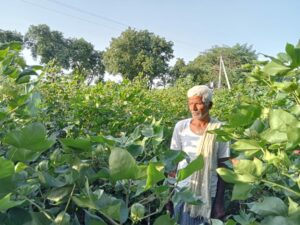The natural farming system prevalent in Andhra Pradesh and Karnataka is one such agrarian system, that is gaining popularity, as a model of sustainable agriculture that has principles of resilience built into it. These farming systems are based on ecological principles but are not prescriptive in nature. Moreover, they are centered on the synergistic relationship between people and nature and have a strong social movement emphasis.
Natural farming system aims (i) to end dependence on external synthetic inputs and agricultural credit, (ii) improve soil condition, (iii) source inputs from local resources, (iv) emphasise conservation of functional biodiversity, (v) reduce reliance on irrigation and (vi) conserve soil moisture. Accordingly, at the core, the natural farming practices are (i) seed treatment using a slurry of cow dung and cows’ urine (Bijamrit) (ii) application of in-situ culture of water, cow manure and urine from indigenous cattle, unrefined cane sugar, legume flour and uncontaminated/virgin soil, to introduce local soil microbiota (Jivamrita) (iii) Acchadana: Live, soil and straw mulching – to conserve soil moisture and (iv) Whapasa: Improving soil aeration – to build soil humus. The fields are designed using the ‘five-layer multi-crop’ model. Unique to this practice is the use of cow dung and urine of indigenous cows, which is the primary ingredient in inputs in natural farming. Thus, the goals and processes of natural farming are aligned with the agroecological principles of equity, synergistic relation between human and nature and decentering of markets.

The natural farming system prevalent in Rachuru has principles of resilience built into it.
Photo : Timbaktu Collective
Natural farming has been recognised as an important pathway for achieving sustainable development goals and is said to have the potential to meet 169 targets of SDGs. The movement has been inclusive of all classes of the peasantry in the states of Karnataka and Andhra Pradesh. Natural farming movement in India is part of the La Via Campesina, the agroecology-based global peasant movement. The system attracted policy attention not only from the national government but also from international development agencies. The Bhartiya Prakritik Krishi Padhati (BPKP), which was introduced in 2020-21 budget, as a sub-scheme of Paramparagat Krishi Vikas Yojana (PKVY) for the promotion of traditional indigenous practices, advocates principles of natural farming and agroecology. Moreover, the practice has found mention in the Union budgets 2019-20 (‘going back to the basics’) and 2020-21. Also, NITI Aayog, the Government of India’s think tank enlists natural farming as a means for doubling farmers’ income A recent NITI Aayog working paper hails natural farming (Agroecology) as a new paradigm for agricultural growth. The state initiatives on natural farming in Karnataka and Andhra Pradesh have also got financial support from national and international funding agencies. State governments of Andhra Pradesh, Karnataka and Himachal Pradesh have specific allocations for natural farming, while governments of Rajasthan, Gujarat and Meghalaya have set up programmes for the same.

